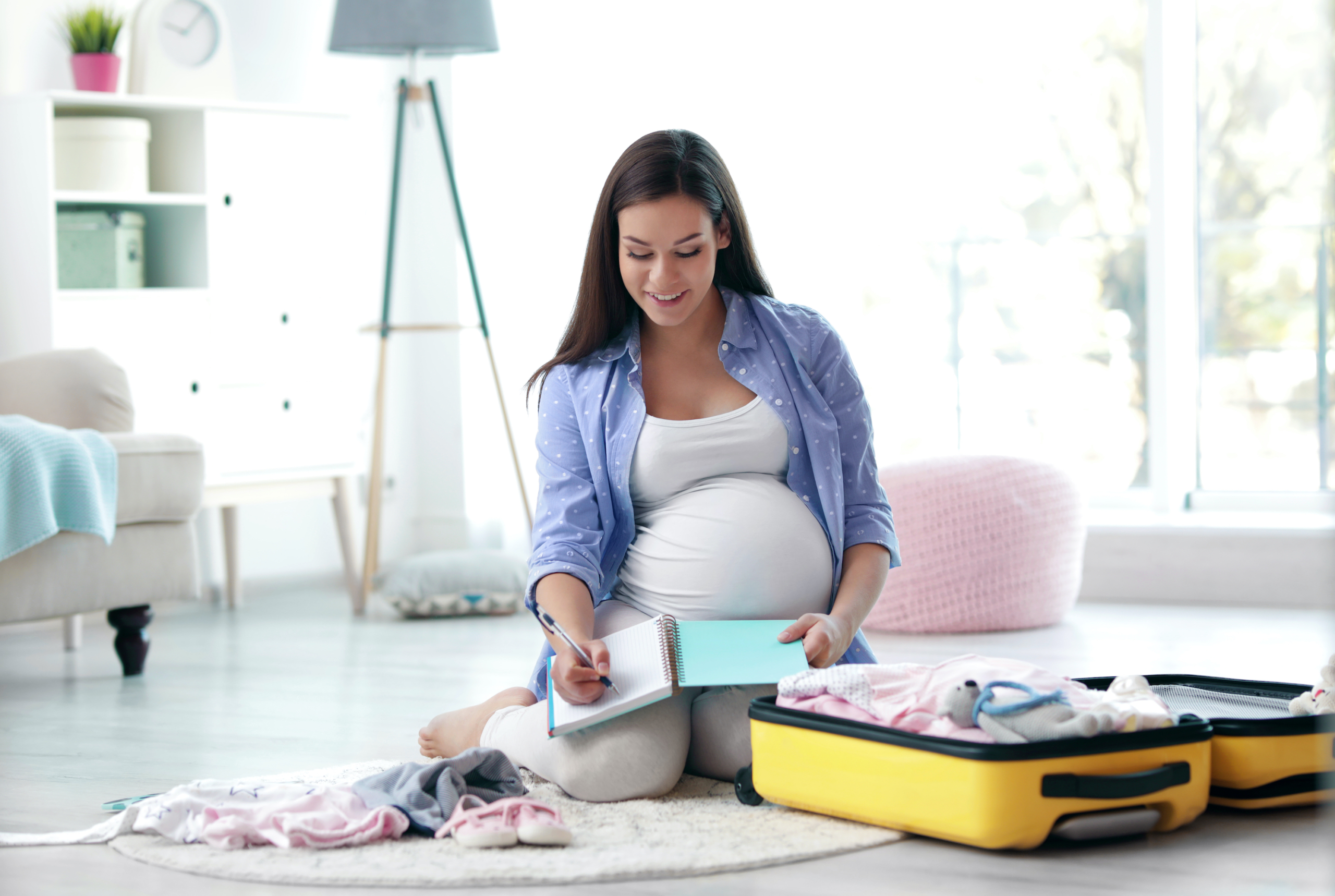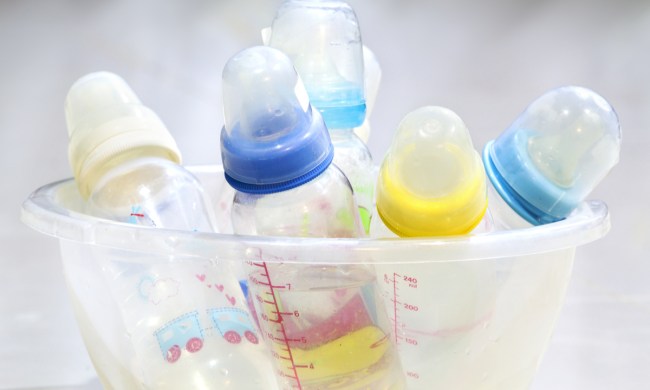You have a cute homecoming outfit for Baby all picked out, the chicest stroller money can buy set up and folded in your trunk, and a room full of half-put-together nursery furniture just waiting for Baby’s big debut. You are ready — well, sort of. The countdown to labor and delivery is on, and while your nesting instincts may be in overdrive, you’ll also want to ensure that you are set up to successfully navigate the postpartum challenges ahead. Now is the appropriate time to scoop up the essentials you might want or need at the hospital and your home to ensure that the postpartum-recovery process is smooth and pain-free — well, as much as possible.
While many soon-to-be moms talk about packing a suitcase for the hospital, we advise having three separate bags ready to go. You will want to have some favorite creature comforts to help you get through labor and delivery (lip balm, headphones, etc.), you’ll need the basics for Baby, and, separately, you should have products for recovery within reach. While stocking all of these items is important, we are going to devote this must-have list to postpartum essentials for moms — because we want you to know what to expect from your body once Baby is born and understand how you can prepare for any and all aches, pains, and potential scenarios.
So grab a pen and paper, and get your postpartum checklist started. You will want to make sure you have these 12 things before you give birth.

Disposable underwear and/or pads
If you’ve typed the question, “what supplies do I need after giving birth?” into a Google search bar, you are not alone by a long shot. And if you are surprised to learn that disposable underwear is at the tippy top of the must-have list, all we can say is: Welcome to the new moms’ club!
Yes, disposable underwear are about as sexy as they sound. And, regardless of whether you have a vaginal birth or C-section, you’ll be going through these paper panties rather speedily; believe it or not, you’ll learn to love them. As your uterus contracts, you will bleed as if you are experiencing a heavy period. While the hospital will have some flimsy, disposable pairs on hand, we recommend finding an option that’s a bit thicker, offers more absorbency, and features a higher waist in case you have a C-section incision scar to work around.
Maxi pads
Maxi pads are must-haves, as well. You will probably need to layer up for a little while until the bleeding tapers off. Choose a pair with adhesive wings so that the pad doesn’t shift or rub up against your stitches and sore skin.
Padsicles
We’re not going to lie. Your vagina will probably feel pretty sore after squeezing out a tiny human being. What’s more, it will be swollen. It will get better in time, but, for now, you are going to need to ice your lady parts on the regular. While your hospital will probably offer thick, bulky ice packs for you to stuff in your paper granny panties, single-use perineal ice packs (aka padsicles) will come in handy. They don’t require a freezer and offer instant cooling relief.
Numbing spray
Whether you tore a lot, a little, or not at all, a little Dermoplast Pain and Itch numbing spray will help to numb any tingling discomfort — at least temporarily. It boasts ingredients like benzocaine, aloe, lanolin, and menthol to mollify and moisturize sensitive skin.
Perennial bottle
Your postpartum nurse will probably hand you a generic “peri bottle” so you can squeeze water on your perineum when you pee or go number 2. Treat yourself (and the delicate skin around your vagina and anus) by upgrading to the Frida Mom Upside Down Peri Bottle. It’s ergonomically designed to help you effortlessly reach and thoroughly cleanse this area. The misting action will keep you refreshed and comfortable down there — it’s essentially a bidet on the go.
Nursing bra/ tank/night gown
If you plan on breastfeeding, you’ll want to have a few nursing bras and tanks on hand (and maybe even a nightgown — that hospital dress has got to go!). While your milk is coming in, choose options without wires; your breasts will be sore and engorged — so a supportive and comfy sleeping bra is best. A U- or C-shaped breastfeeding pillow can also help ensure comfortable feeding sessions for you and Baby while you both work to get the hang of it.
Nursing pads
It might take a little while for your milk to come in. Or, if this is not your first rodeo (birth), you might find yourself engorged on day two. Be prepared with a stack of nursing pads in your hospital bag. These will ensure that you don’t leak breast milk all over the going-home outfit you meticulously picked out.

Nipple cream
Your nipples can get sore from all that attempted latching. Be prepared for cracking, bleeding, burning nipples (we promise this too shall pass). Having Bamboobies Nipple Cream on hand will help heal your sensitive skin and take the edge off — until the next nursing session, that is. It’s USDA-certified organic, made with safe ingestible ingredients for Baby, and lanolin free — so slather away.
Stool softener
Your doctor will probably have you take a stool softener at the hospital, but, word to the wise: You should have a bottle waiting for you at home, too — just in case. That first postpartum poop can be scary, so you want your stool to be soft and smooth to curtail any unnecessary pushing and pain. If your doctor or postpartum nurse gives you the go-ahead, simply add some MiraLax to your morning juice to get things moving and grooving down below.
Sitz bath
If you didn’t get a sitz bath at the hospital, you’ll be happy to have one once you return home. After a vaginal birth, your perineum will need a lot of TLC. Soaking your tush in lukewarm water once or twice a day for a few minutes can have a soothing effect, keep stitches clean, and hydrate skin. The plastic or rubber basin basically just sits on the toilet, so you can soak from a comfortable position. Ask your OB-GYN about adding herbal products to your sitz bath. Or, just stick to plain old H2O — you’ll be amazed at how relieving it can be. It’s like a day at the spa for your most private parts.
Donut pillow
Yes, you’re going to be on your feet a lot with a new baby. But you will also be recovering; you’ll need rest and relaxation, too. Finding down time can be especially hard when it hurts to, well, sit down. If you have a stitched-up tear or are recovering from an episiotomy, you might need a little extra cushion for your tush so that you’re not perpetually shifting in your seat. A postpartum donut pillow goes under your caboose to keep you comfortably positioned.
Ibuprofen
If your doctor has recommended a regular pain-and-inflammation-reducing ibuprofen routine, make sure you’re stocked at home. Don’t try to be a hero — you have a little human to take care of now; stay on top of your medication (usually every six hours!) so that you both can adjust to this new normal more readily, and, hopefully, more comfortably. Of course, talk to your doctor before starting a postpartum pain regimen on your own.
Use this checklist and stock up in advance, so you are ready for recovery and prepared for the postpartum period ahead. That way, when the time comes, you can shift your focus to what really matters: That new little love of yours. Good luck!


